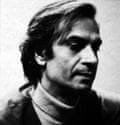Think Twice: Michael Jackson Audible Original and Wondery
Courtroom Drama Crime+Investigation and ITN
Sunday Feature: Recording on the Nomads’ Trail (Radio 3) | BBC Sounds
Here’s a good deep-dive podcast that I somehow missed when it was released in the summer. Think Twice takes a detailed look at one of pop’s weirdest and most talented idols, Michael Jackson. Journalist Leon Neyfakh (of Slow Burn) and hip-hop expert Jay Smooth are of different generations – Smooth was brought up listening to Jackson, Neyfakh not so much – but they both understand how important he was: an astoundingly gifted musician and performer.
As we all know, though, Jackson was not only that. He was a black man uncomfortable with his face and body; a highly flawed star accused of the sexual abuse of children. Somehow, Think Twice manages to tackle these difficult topics without being judgmental, though both reporters conclude that they think Jackson was guilty of child abuse. Over 10 episodes it carefully tells a social history, as well as Jackson’s personal one – how did the world react to him at the time? – and it’s the better for it.
And God, there’s a lot in it: more than 100 interviews. In episode one, we meet a man who worked with Jackson on an unreleased 1990s film, where Jackson played a man accused of scaring children by his magic, who ends up being chased by their parents with pitchforks. (Which is… weird.) In the penultimate episode we hear from a juror from the 2005 court case in which Jackson was accused of child abuse: Melissa Herard, juror No 8. She remembers the trial well. “I liked it when Janet [Jackson’s sister] was there – she’s so pretty,” she says.
The trial’s “not guilty” verdict, which made no sense at the time, becomes more understandable when you’re told that Jackson’s attorneys played the jury the entire uncut footage of Martin Bashir’s TV interviews with the singer. (“I couldn’t stand the man,” says Herard of Bashir.) “Through those films, Michael [explained] his side of the story without ever having to take the stand and be questioned,” says a courtroom journalist.
Think Twice’s presentation is occasionally a bit dry, but the journalism is exceptional, reminding you of all you’ve forgotten and telling you what you never knew. Recommended, especially if you have a long journey (it’s Christmas soon – you will).
More celebrity court palavers in a new five-part show: Courtroom Drama takes various real-life trials and sort of recreates them and sort of analyses them. Presenter Jackie Adedeji and Grace Rose Gwynne, a barrister, work through some properly juicy cases: when Britney Spears took her own family to court; Johnny Depp v Amber Heard; Gwyneth Paltrow’s ski-and-run case; and, of course, Wagatha Christie. It’s all mad, daft, extremely hectic fun, with the script drawn from actual court testimony, actors taking on various parts, and Adedeji and Gwynne racing through facts and leaning into judgment.
Perhaps it’s no surprise then that, as an older listener, I felt a mismatch between my attitude towards celebrities and that of the hosts. They’re of a generation that likes to dismiss all journalism as nasty and untruthful, and celebrate all famous people as great, as long as they’re authentically promoting their own brand and aren’t oppressing anyone. The truth, as so often, lies somewhere in the middle. But that’s not really the point of this full-on, set-off-the-biggest-fireworks show. Not for me, but perfect for in-depth sleb gossip analysts.

Recording on the Nomads’ Trail is, you may not be surprised to learn, a quieter listen. A Radio 3 Sunday Feature, it explores the pioneering life of Deben Bhattacharya, an Indian sound engineer, music producer and field recordist, who discovered, on moving to England in the 1940s, that there were very few recordings of Indian music, and decided that he should be the man to make them.
So he bought a car – though he couldn’t drive – and got a friend to drive with him back to India, recording all the way. Bhattacharya had an idea that the music of the Camargue in southern France was directly connected to the music of Indian nomads, and he collected field recordings as he travelled. Paul Purgas talks to Bhattacharya’s family, as well as academics, and discovers a complicated man, charismatic and ego-driven (he didn’t always put the names of the singers on the records he produced). “I can say many things,” says an expert, concerning Bhattacharya’s faults. “But should we say it? We should and we shouldn’t as well.” In other words: he was working within his time – should we be the judge?

